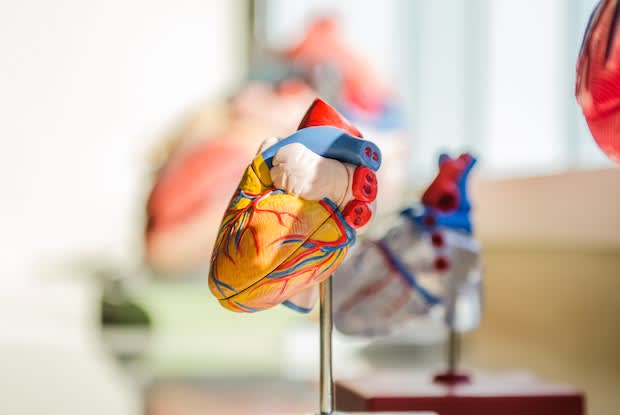Table of Contents
An overactive or underactive thyroid can weaken metabolism and throw many bodily functions out of balance. Thyroid disorders can occur when an autoimmune disease like Hashimoto’s is present, causing antibodies to attack the thyroid. Early treatment can usually keep thyroid disorders under control. Commonly prescribed thyroid medications include Tapazole (methimazole), Synthroid (levothyroxine), and desiccated thyroid.
If thyroid disorders are allowed to persist untreated, severe complications may occur. Mild complications of thyroid disorders include thyroid nodules and goiters, while serious complications range from kidney and heart problems to infertility, nervous system breakdown, and problems during pregnancy. [1]
Thyroid Nodules
Nodules describe growths that can form in and around the thyroid gland. These nodules are typically solid, but they can be filled with fluid as well. Prolonged iodine deficiency is usually to blame for thyroid nodules, but Hashimoto’s disease can also cause these growths. Most of the time, thyroid nodules may be too small to feel. However, thyroid nodules that grow large enough and swell in the neck can cause breathing difficulties and pain when swallowing. Large thyroid nodules have also been known to produce abnormally high levels of thyroid hormone, which can lead to:
- Damp skin
- Heightened pulse
- Increased appetite
- Nervousness
- Tremors
- Weight loss
Thyroid nodules are mostly benign. In rare cases, they can be cancerous. The risk of developing thyroid nodules increases with age. Nodules are also more common in women than men. If a thyroid nodule becomes too large, it turns into a goiter. [2] Goiters are much more visible than typical thyroid nodules and may appear as big bulges on the neck. When the thyroid does not produce enough hormone, it can try to compensate by overexerting. As a result, the enlarged mass can put pressure on the windpipe and cause very uncomfortable symptoms. [3] Goiters can cause: Goiters can grow to be very large, at which point surgical removal is often necessary to relieve some of its symptoms. Goiters on the smaller side are typically treated with synthetic thyroid hormones like Synthroid (levothyroxine). Supplying thyroid hormone to the thyroid can prevent it from overworking, stabilizing the size of the gland. [5] Severe hypothyroidism (underactive thyroid) is linked to reduced kidney function. This is because the two disorders share similar causes and often occur at the same time. Low levels of thyroid hormone can cause chronic kidney disease. Conversely, kidney disease can interfere with thyroid function by increasing iodine levels. [6] Glomerulonephritis (immune kidney disease) is shown to be associated with Hashimoto’s and may lead to an underactive thyroid. For people with immune kidney disease, the antibodies that target the kidneys also attack the thyroid, worsening both organs simultaneously. [6] Another factor that can cause thyroid and kidney problems to occur at the same time is a protein in the urine. High levels of protein in the urine can deplete thyroid hormones while causing kidney damage. For those taking a synthetic thyroid hormone, higher doses may be needed if high levels of protein in the urine are detected. [6] Both an underactive and an overactive thyroid may lead to heart complications. An underactive thyroid can result in heart disease and heart failure. This is because high cholesterol often accompanies hypothyroidism. [7] For those with an overactive thyroid (hyperthyroidism), an increased heart rate can lead to a heart rhythm disorder known as atrial fibrillation. This condition increases the risk of stroke and congestive heart failure. [8] Peripheral nerves transmit information from the brain and spinal cord to the rest of the body. Prolonged untreated hypothyroidism can severely hurt the peripheral nerves and cause peripheral neuropathy. This condition involves numbness, pain, and tingling where affected. [7] Thyroid hormones are crucial for fertility. Consequently, hypothyroidism and the low levels of thyroid hormones can hinder fertility. Sometimes, autoimmune disorders can impair fertility as well, so hypothyroidism caused by Hashimoto’s disease can increase the risk of infertility. [7] Pregnant women may need to be examined for thyroid disorders because untreated thyroid disease can increase the risk of birth defects. Having a compromised thyroid during pregnancy may also increase the risk of developmental problems in the baby. At birth, an infant with hypothyroidism may be prone to physical and mental impairment during development. The good news is that hypothyroidism in babies diagnosed in the first few months significantly improves the chances of normal development. [7] While hyperthyroidism and hypothyroidism can lead to many complications, early treatment can usually prevent the occurrences of such complications. Tapazole (methimazole), Synthroid (levothyroxine), and desiccated thyroid are available to treat thyroid problems. Talk to your doctor right away if you detect symptoms of a thyroid disorder. The content in this article is intended for informational purposes only. This website does not provide medical advice. In all circumstances, you should always seek the advice of your physician and/or other qualified health professionals(s) for drug, medical condition, or treatment advice. The content provided on this website is not a substitute for professional medical advice, diagnosis, or treatment.
Goiters

Kidney Function
Heart Problems

Nervous System
Infertility
Pregnancy
